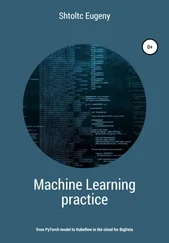Matt Richtel - The Cloud
Здесь есть возможность читать онлайн «Matt Richtel - The Cloud» весь текст электронной книги совершенно бесплатно (целиком полную версию без сокращений). В некоторых случаях можно слушать аудио, скачать через торрент в формате fb2 и присутствует краткое содержание. Жанр: Триллер, на английском языке. Описание произведения, (предисловие) а так же отзывы посетителей доступны на портале библиотеки ЛибКат.
- Название:The Cloud
- Автор:
- Жанр:
- Год:неизвестен
- ISBN:нет данных
- Рейтинг книги:3 / 5. Голосов: 1
-
Избранное:Добавить в избранное
- Отзывы:
-
Ваша оценка:
- 60
- 1
- 2
- 3
- 4
- 5
The Cloud: краткое содержание, описание и аннотация
Предлагаем к чтению аннотацию, описание, краткое содержание или предисловие (зависит от того, что написал сам автор книги «The Cloud»). Если вы не нашли необходимую информацию о книге — напишите в комментариях, мы постараемся отыскать её.
The Cloud — читать онлайн бесплатно полную книгу (весь текст) целиком
Ниже представлен текст книги, разбитый по страницам. Система сохранения места последней прочитанной страницы, позволяет с удобством читать онлайн бесплатно книгу «The Cloud», без необходимости каждый раз заново искать на чём Вы остановились. Поставьте закладку, и сможете в любой момент перейти на страницу, на которой закончили чтение.
Интервал:
Закладка:
I take a deep breath. “Alan Parsons. He wanted to bribe Andrew Leviathan.”
I’m surprised to hear the sentence come out of my mouth. I’m not sure if it’s true or just sounds right or how, in either case, I made the connection.
“The rich Silicon Valley guy? What’s he got to do with. .”
I cut her off. “Alan tipped me off about you and PRISM. You know Alan? Big guy, drinker. He found out about the technology, but needed me to get him more information.”
I watch her eyes carefully when I mention his name again but she indicates zero recognition. She doesn’t blink or avert her gaze. She doesn’t know him.
“Alan was working with Faith.”
“Damn it, start making some sense.”
I continue. I explain that Alan suggested I look into a story involving Sandy and PRISM and some dangerous new technology. She clenches her jaw. I wait for her to say something but she doesn’t. I try to think about what I actually know and what I might surmise. I start thinking aloud, trying to put any of the pieces together.
“It’s technology for kids. So they can do more multitasking, juggling, like you told me.”
“It’s a huge market. So what?”
“Sandy, you’re misunderstood.”
“What do you mean?” She loves any sentence revolving around her.
“You got hired by PRISM because you understand people and how to communicate ideas to kids. They wanted you to work with kids at the learning annex to get them to test the technology. They thought you could reach the kids, be a good entree, ’cause you’ve got some notoriety and had spent some time in jail yourself as a youngster. They ultimately want to see what it does to their brains. But they also thought they could get you to keep dirty secrets. That’s not your way of doing things. You’ve got your own code.”
She chews on this.
“It’s a joint effort between the Chinese government and Andrew Leviathan.”
She doesn’t respond.
I continue thinking aloud. “He built some amazing software, and PRISM is building the hardware. It’s a classic relationship; the software gets made in the United States, and low-cost Asian manufacturers build it, import it, pay licensing fees to the American innovator. In this case, the technology is marketed as a way to help kids multitask, to make their brains stronger so they can deal with the onslaught of data in the digital world. Text messages and instant messages, Facebook status updates, phone calls, tweets, all of it. The idea is to build better brains-21st-century gray matter to digest all the machine chatter.
“I told you that already. It was off the record.”
“But it has a side effect.” I’m building steam. “It actually. .” I pause to let myself think before I mutter it. “It retards development.”
I think about the pile of files on the ground in front of the fire, the MRI of the frontal lobes. I can’t tell anything from the grainy pictures that have no other identifying information than a few letters and numbers on the back.
From anatomy class eons ago, I picture the frontal lobes. They’re beige but with a grayish tinge if soaked in formaldehyde. Like the rest of the brain, they’re deeply contoured, tiny hills and valleys of essential gray matter. But they stand apart from the rest of the brain. They make us human by allowing us to organize information, set priorities, establish control over our lives, or try to. They let us, to borrow Biblical language, establish our dominion over our world. And they develop last, often not fully formed until people are in their thirties or even forties. Without them, we remain impulsive, childlike, likely to have trouble establishing priorities. It’s no mystery, I think, I’m acting somewhat irrationally given a concussion that has temporarily set back my frontal lobe a few development cycles.
“What happened to your eye?” Sandy asks.
The question hardly sounds maternal but it’s curious in a way that suggests she’s softening.
“I went to Chinatown to follow a lead and got clobbered by a thick guy with a crooked smile. He looked like a bouncer at a prison nightclub.”
“Steve.”
Steve. “You know him?”
“Not really. He hired me, and ran interference with management at PRISM. Kept the parents from being a pain in the butt. How much is he paying you? He pays well.”
“PRISM isn’t running this operation?”
“I report to Steve. I think you do too.”
“I swear to you, Sandy. He’s my enemy.”
“He’s always talking about security breaches and how he used to deal with them in rural China. Likes to use the word ‘electrodes,’ and sounds stupid when he says it. Clyde says I shouldn’t buy a word of it. But it wouldn’t surprise me if he put you up to this to see if I’m violating my confidentiality agreement.”
“He tried to set you on fire. And me.”
I hold out my singed forearms. She looks at them, unconvinced. I know that look, something like pity and skepticism. I feel like I engender that look more than is healthy.
We’re at an impasse.
“I see a counselor.”
“What?”
“Her name is Wilma. I see a counselor named Wilma.” I’m now talking for Sandy’s benefit as much as for mine. My sentences feel just shy of revelation. I’m remembering that once a week I go to Wilma and, after many months of sitting across from the gangly counselor in a high-backed chair in a boxy office, I resigned myself to lying, cliche-like, on a stiff couch. But I can still sense Wilma’s looking at me with pity and skepticism when I recite the goings-on of each week. I remember my latest homework assignment for her: I’m supposed to define the word “loss,” or some inane exercise like that. How has this memory eluded me the last few days? What else have I forgotten or misunderstood or misplaced since Alan Parsons slammed my head onto the subway pavement? Didn’t it happen when I was heading home from Wilma’s office?
“Admitting you see a shrink-is that supposed to make me sympathetic? Just because you’re weak doesn’t make you an ally.”
“Go fuck yourself, Sandy.”
She smiles, a kilowatt grin. It’s the kind of raw response she craves.
“Clyde returns tonight, in a few hours. He’s been in Wyoming shooting photos of some rich family on a luxury camping trip.”
“Good for you.”
“Should be home anytime and he won’t hesitate to shoot you. Actually, he probably won’t shoot you but he will blacken your other eye.”
“I won’t give him any reason to do so. Besides, I don’t see why it’s a big deal that you basically ran classes at the learning annex. It’s why they recruited you. They knew you’d be good with this population.”
She stands up, still training the rifle on me. “I want a share of the movie rights.”
“For what?”
“Do you agree?”
I nod. I have no idea what she’s talking about.
“Don’t you dare print that I just do volunteer work at the learning annex. That’s slander, or libel or whatever. It’s a bigger job than that. Otherwise, why would they have tried to burn the place?”
“But it sounds like you were just monitoring the kids, babysitting, essentially. .”
“I knew something weird was going on,” she cuts me off, as I’d hoped. “I told Clyde. I told him it was more than just keeping those kids entertained and product refinement.”
“What product?”
She says: “You honestly won’t believe how cool this is.”
43
Sandy takes two steps back from the chair just as I feel my phone buzz. I’m not sure whether to answer when it becomes clear that Sandy has picked up my distraction. She tells me to pull out the phone and put it on the table. She watches the movements carefully. The phone buzzes again, jumping lightly on the table, then stops.
Читать дальшеИнтервал:
Закладка:
Похожие книги на «The Cloud»
Представляем Вашему вниманию похожие книги на «The Cloud» списком для выбора. Мы отобрали схожую по названию и смыслу литературу в надежде предоставить читателям больше вариантов отыскать новые, интересные, ещё непрочитанные произведения.
Обсуждение, отзывы о книге «The Cloud» и просто собственные мнения читателей. Оставьте ваши комментарии, напишите, что Вы думаете о произведении, его смысле или главных героях. Укажите что конкретно понравилось, а что нет, и почему Вы так считаете.












